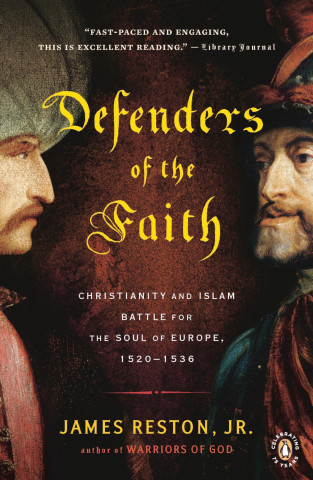Defenders of the Faith: War of the worlds
While reading the book it is easy to forget that one is reading history and not a work of historical fiction.

Defenders of the Faith: War of the worlds
This isn’t a tale of the modern Muslim world, but rather the story of 16th century Europe, beset by internal turmoil and external threats, and seemingly incapable of dealing with either. It is the story of sixteen years that shook the world.
In writing historical works it is easy, through the benefit of hindsight, to become lost in the grand design. Some writers begin to concentrate too much on the broad strokes of history, and view the way events panned out as part of some inevitable process in which the actions of individuals are meaningless, or at best, footnotes to the larger story. In Defenders of the Faith James Reston Jr does not make that mistake.
This is very much a story of men, with all their foibles, prejudices and brilliance. It is a tale of the dour and practical Holy Roman Emperor Charles V and his Muslims rival, the grandiose Sulayman the magnificent, Sultan of the Ottoman Empire. Sulayman, eager to outshine his father, set his sights on finally defeating the Holy Roman Empire and spreading Islam across Europe. Charles V, though aware of the threat at Europe’s doorstep was too mired in the fratricidal politics of the European courts to focus on the real danger.
It is a rare writer that can make historical characters come to life. It is far easier to ascribe motivations and agenda to characters we have plucked out of our imagination, but by dint of painstaking research and a gifted quill James Reston Jr presents us not only with characters we come to know and understand, but also explains what circumstances lead to their rise and fall. There is the flamboyant and ambitious Francis I of France, the grasping Henry VII of England, the proud Ottoman vizier Ibrahim Pasha, the passionate Martin Luther King and a succession of feckless and venal Popes more concerned with political power than spiritual growth.
One gets so caught up in the sweep of this book that it is easy to forget that one is reading history and not a work of historical fiction. Despite knowing better I found myself hoping that Vienna would fall to the Turks, or that the Ottomans would not let harem politics prevail over statecraft. But these issues had been decided centuries ago. In revisiting that era it is easy to find parallels to the present position of Pakistan and the Muslim world. All the elements of 16th century Europe are present in the here and now: the sectarian schisms, the hair-splitting theological debates that hamper rational thought, the political divides and the rulers whose only goal is self-preservation. But there is also a lesson to learn from Defenders of the Faith, and it is this: nothing is inevitable.
Published in The Express Tribune, Sunday Magazine, March 27th, 2011.



















COMMENTS
Comments are moderated and generally will be posted if they are on-topic and not abusive.
For more information, please see our Comments FAQ